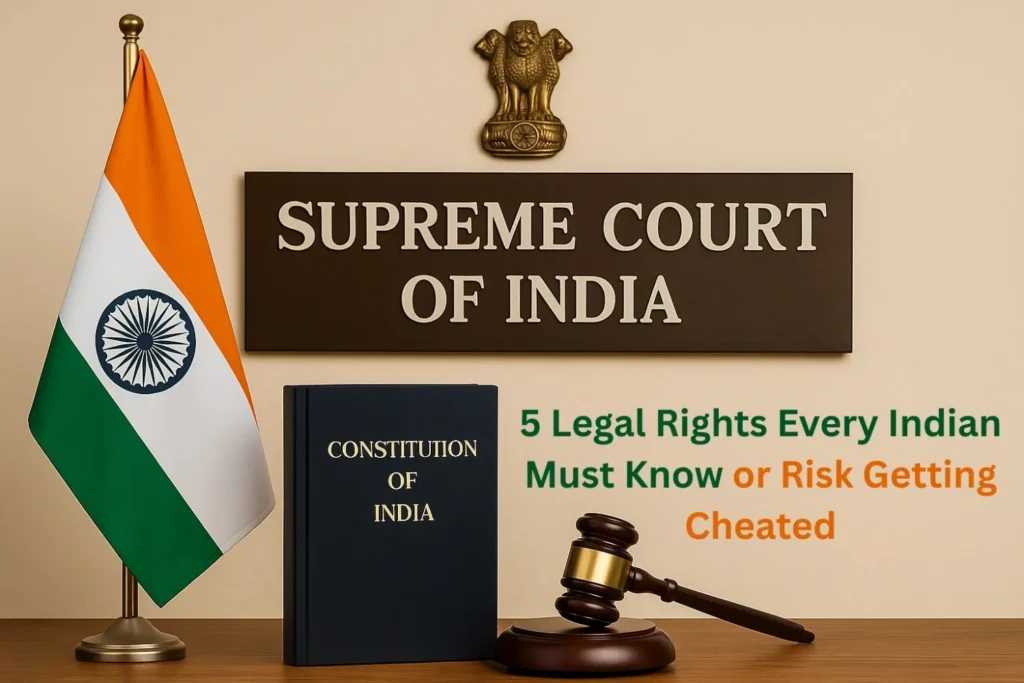Introduction:
India is the world’s largest democracy, and every Indian citizen is entitled to certain legal rights as per the Constitution and new criminal laws. Unfortunately, a large section of the population remains unaware of these rights, making them easy targets for exploitation. This article highlights five essential legal rights that every Indian should know.

1️⃣ Right to Lodge an FIR at a Police Station
As Per Section 173 of the Bharatiya Nagarik Suraksha Sanhita (BNSS) 2023:
- You may report any cognizable offence verbally or electronically.
- The police officer is required to document your statement in writing, read it aloud to you for confirmation, and then take your signature to verify its accuracy.
- If the complaint is lodged through electronic means, the police must obtain your physical signature within three days of filing.
- A free written copy of the FIR must be provided immediately.
If the police refuse to register the FIR, you may file a written complaint with higher authorities; and if no action is taken, approach a magistrate for redress.
Legal Base: Section 173, BNSS 2023
2️⃣ Conditions for Arrest Without a Warrant (As per Section 35, BNSS 2023)
According to Section 35 of the Bharatiya Nagarik Suraksha Sanhita (BNSS) 2023, the police can arrest a person without a warrant only in specific circumstances. Normally, an arrest requires a warrant, but in the following situations, arrest without a warrant is permitted:
- If a person is caught committing a cognizable offence.
- If the police have credible information or suspicion that the person has committed a crime punishable with seven years of imprisonment or more.
- In cases punishable with less than seven years, if there’s a chance the person may abscond, destroy evidence, or threaten witnesses.
- If a person is found possessing stolen property or caught planning a crime.
- If the police believe arrest is necessary to ensure the investigation or judicial process is not hindered.
- If a notice has been served to the person, and they fail to appear without a valid reason.
- Arrest of elderly persons (above 60 years) or those who are seriously ill requires prior permission from a senior officer.
Legal Base: Section 35, BNSS 2023
3️⃣ Right to Free Legal Aid
Those who cannot afford legal representation have the right to avail free legal assistance. Where to Apply:
- District Legal Services Authority (DLSA)
- State Legal Services Authority (SLSA)
- National Legal Services Authority (NALSA)
Legal Base: Article 39A of the Constitution of India
4️⃣ In an emergency situation, it is mandatory to provide immediate medical treatment to the patient.
In an emergency situation, it is mandatory to provide immediate medical treatment to the patient. Treatment cannot be denied on the grounds of lack of money. Whether the treatment will be free or chargeable depends on the situation, the hospital’s policies, and applicable government schemes.
Based on the Supreme Court’s verdict in Paschim Banga Khet Mazdoor Samity vs State of West Bengal, 1996
5️⃣ Consumer Rights
Under the Consumer Protection Act 2019, you have rights such as:
- Right to safe and quality products.
- Right to compensation for faulty goods.
- Right to file complaints against misleading ads.
Legal Base: Consumer Protection Act, 2019
Conclusion:
Being aware of these five essential rights is your shield against harassment and exploitation. Share this article to empower others with legal awareness.
Disclaimer: The sole aim of this article is to spread legal awareness and provide general information to readers. It holds no intention to disrespect or malign any person, institution, or authority.

Narendra Singh is the founder of this website. He has considerable experience in the hotel industry. Through his articles, he expresses his views to make people aware of the evils going on in the society and to avoid them. To fulfill this objective, he has switched his 18 years long career of the hotel industry and entered in his favorite and interesting career, media. He not only warns against social evils, Rather, by using the Right to Information Act 2005, they expose social evils and inform the concerned department for action against the culprits.
